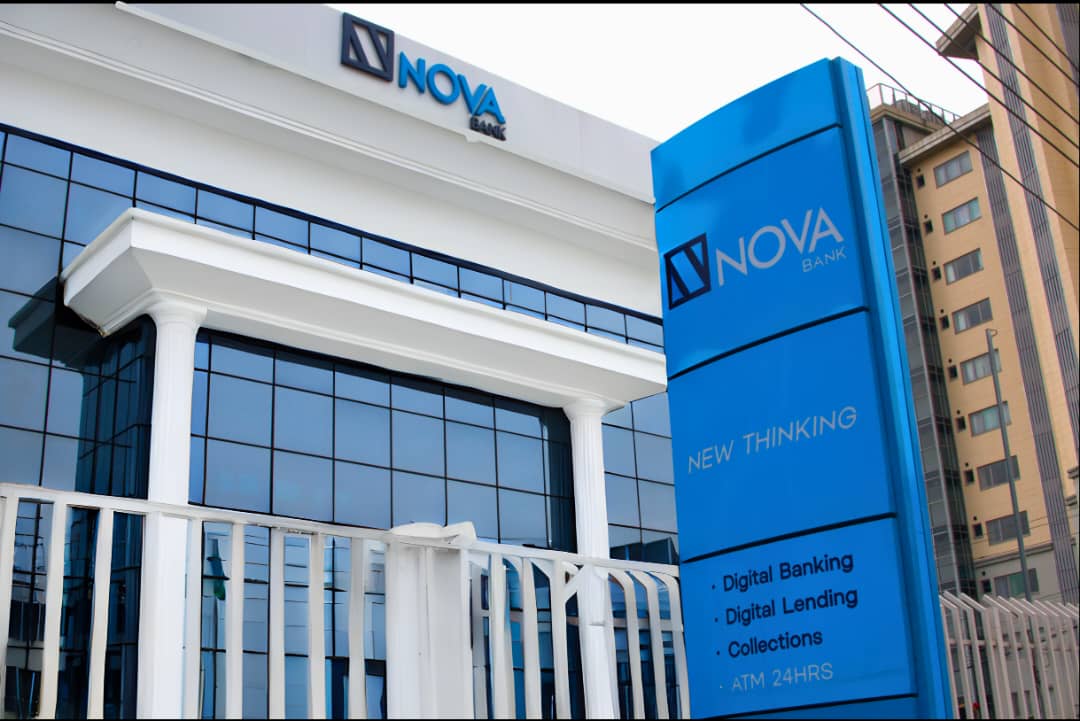E-Financial
Nigerian Stocks Ride on CBN Optimism

By Lukman Otunuga, Senior Research Analyst at FXTM
Nigerian stocks are on route to ending the trading week almost 1% higher after the Central Bank of Nigeria expressed optimism over the economy during its 274th Monetary Policy Meeting (MPC).
Buying sentiment towards the All Share Index (ASI) found further support from giant Dangote Cement, after the company revealed share buyback plans. According to the CBN governor, the “Nigerian economy is still very strong and resilient” in the face of COVID19 with the banking sector weathering the current storm. However, as coronavirus cases in Africa’s largest economy near 39,000, concerns are likely to mount over renewed lockdowns and rising unemployment. Given the constant disruptions, chaos and economic instability caused by COVID-19, the outlook for Nigeria and many other emerging markets remains clouded by uncertainty.
Rising inflationary pressures in Nigeria are likely to discourage the CBN from cutting interest rates anytime soon. The Central Bank left benchmark interest rates unchanged at 12.5% during its meeting in July, and this may remain the status quo for the rest of 2020. With interest rates expected to remain unchanged, more attention will be directed to unconventional monetary policy tools and fiscal policy which is seen as a sharper and more effective weapon against the coronavirus menace. The Federal Reserve approved a 2.3 trillion Naira stimulus boost at the end of June to bolster key sectors of the economy with a 12-month timeline for implementation. Will this have the desired impacts on economic growth? Time will tell.
External factors in the form of Oil prices, US-China trade tensions, China’s economy and the Dollar’s performance among many other themes will influence Nigeria’s growth outlook for 2020. Oil’s performance over the next few weeks will determine whether OPEC+ made the right move to taper record production cuts from 9.7 million barrels to 7.7 million. Speaking of commodities, Gold has jumped to a fresh 9 year high above $1895. This is good news for Nigeria after the country refined its own Gold and purchased the product into a new Gold reserve
E-Financial
SEC DG Warns as Crypto Adoption Rises in West Africa Without Proper Regulations

Dr. Emomotimi Agama, Director-General of the Securities and Exchange Commission (SEC) Nigeria, has said that West Africa is fast emerging as a global epicentre for virtual asset adoption, propelled by a young, tech-savvy population and macroeconomic instability.

Speaking at the West Africa Compliance Summit organised by the Inter-Governmental Action Group against Money Laundering in West Africa (GIABA) in Praia, Cape Verde, Dr. Agama warned that while the region’s embrace of digital currencies is accelerating, the absence of coordinated regulation leaves it vulnerable to financial crimes and illicit capital flows.
“With over 60 percent of West Africa’s population under the age of 25 and mobile-first fintech platforms thriving, the region has become a global hotspot for virtual asset adoption,” he said. “But we must act decisively. Regulation is not optional, it is an imperative.”
The summit, themed “Adapting and Thriving in a Complex and Evolving Compliance Landscape,” brought together financial regulators, compliance professionals, and security experts to explore the challenges posed by the rapid rise of virtual assets and decentralised finance (DeFi).
Dr. Agama disclosed that crypto transactions in Nigeria alone surpassed $56 billion in 2024, with citizens increasingly turning to stablecoins such as USDT and USDC to hedge against volatile local currencies. He highlighted the growing trend of “crypto-dollarisation,” noting that young professionals now demand salaries in stablecoins, while businesses are adopting platforms like Binance Pay for cross-border transactions.
“The naira’s depreciation, Ghana’s cedi weakness, and persistent forex shortages have fueled this shift,” he explained. “Traditional remittance channels charge up to 10 percent in fees, while cryptocurrencies offer faster and cheaper alternatives. Over $20 billion in remittances flowed into West Africa last year through crypto channels.”
However, he also cautioned that the same innovations driving financial efficiency are increasingly being exploited by fraudsters and criminal actors. He cited GIABA’s report of $2.1 billion in suspicious crypto-related transactions across West Africa in 2024 alone, including the use of privacy coins by terror financiers to evade detection.
“Unregulated exchanges, artificial market crashes, DeFi ‘rug pulls,’ and Ponzi schemes have wiped out billions in investor funds,” he said. “The recent collapse of the CBEX Ponzi platform is just one of many such incidents. Strong regulation and regional coordination are the only path forward.”
Dr. Agama pointed to Nigeria’s recent legislative progress, especially the enactment of the Investment and Securities Act 2025, which formally classifies virtual assets—including cryptocurrencies, stablecoins, utility tokens, and NFTs—as securities under Section 355(4) and Part I of the Second Schedule.
“Under the new law, all exchanges, wallets, and DeFi platforms must be licensed by the SEC,” he stated. “We’ve also established a Fintech and Innovation Department to facilitate ongoing dialogue with industry stakeholders and adapt our regulations to emerging realities.”
He called on West African governments to harmonise regulatory frameworks and strengthen intelligence-sharing, proposing a Unified Virtual Asset Service Provider (VASP) Licensing System under the ECOWAS framework.
“A crypto trader banned in Nigeria should not find safe haven in Ghana,” he asserted. “Financial crime knows no borders. Our collective future depends on our ability to secure this emerging financial frontier.”
E-Financial
NOVA Bank Deepens Market Presence with New Branches and Regional Focus

NOVA Bank has announced its intention of a strategic shift in its operating license from a national to a regional authorisation, a move, which according to the Bank is aimed at optimising operational efficiency and deepening its impact within key markets.

The management of the Bank noted that the repositioning aligns with the Bank’s long-term vision to consolidate its strengths, streamline its services, and deploy capital more effectively within targeted regions, without compromising its commitment to innovation, customer satisfaction, and sustainable growth.
To this effect, NOVA has applied to the CBN to recategorize its operating license from a National to a Regional Commercial Banking license.
According to the Bank, NOVA maintains a strong financial position, underpinned by robust capital adequacy, liquidity ratios, and a consistent growth trajectory.
NOVA’s Acting Managing Director/Chief Executive Officer, Mrs. Chinwe Iloghalu, explained that following the Central Bank of Nigeria’s (CBN) revised recapitalisation directive in March 2024, NOVA reviewed its growth trajectory and capital utilisation strategy.
“Given the Bank’s current stage of growth, we have chosen the prudent route to optimise what we need, grow efficiently, and scale sustainably. This is a major strategic positioning that will ensure continued efficiency in the deployment of assets and resources,” she said
Mrs. Iloghalu further stated “Indeed, our shareholders have shown strong commitment to ensuring full capitalisation through rights issue by injection of additional 24 billion before end of 2025 to exceed the prescribed capital for regional Banks well ahead of the 2026 CBN deadline”.
In a further affirmation of its strength and stability, Global Credit Rating (GCR) recently reaffirmed NOVA Bank’s BBB rating with a Stable Outlook, citing the Bank’s healthy liquidity profile, improving earnings, and sound asset quality.
The Bank’s audited 2024 financials validate the effectiveness of its growth strategy, recording over 200% year-on-year growth in profit before tax (PBT), alongside improvements across all key financial indicators.
NOVA is set to launch three new branches in the coming weeks, including Owerri, Port Harcourt, and Abuja, to enhance physical access and customer service, while strengthening its digital banking infrastructure to ensure customers continue to enjoy secure, seamless, and convenient banking experiences, anywhere, anytime.
The Chairman of the Board, Mr. Phillips Oduoza, noted that NOVA remains committed to its vision and is thankful for the continued trust of its customers, shareholders, and regulators.
“Every decision we make is deliberate and strategic, guided by sound governance and market insight. Transitioning to a regional license is a recalibration, giving us room to grow optimally, build capacity, and position ourselves for a full national rollout in the next 36 months.” Said Oduoza
E-Financial
West Africa Emerging as Crypto Adoption Epicentre- SEC Boss

West Africa is fast emerging as a global epicentre for virtual asset adoption, propelled by a young, tech-savvy population and macroeconomic instability, according to Dr. Emomotimi Agama, director-general, Securities and Exchange Commission (SEC) Nigeria.

Dr. Emomotimi Agama, DG, SEC
Speaking at the West Africa Compliance Summit organised by the Inter-Governmental Action Group against Money Laundering in West Africa (GIABA) in Praia, Cape Verde, Dr. Agama warned that while the region’s embrace of digital currencies is accelerating, the absence of coordinated regulation leaves it vulnerable to financial crimes and illicit capital flows.
“With over 60 percent of West Africa’s population under the age of 25 and mobile-first fintech platforms thriving, the region has become a global hotspot for virtual asset adoption,” he said. “But we must act decisively. Regulation is not optional, it is an imperative.”
The summit, themed “Adapting and Thriving in a Complex and Evolving Compliance Landscape,” brought together financial regulators, compliance professionals, and security experts to explore the challenges posed by the rapid rise of virtual assets and decentralised finance (DeFi).
Dr. Agama disclosed that crypto transactions in Nigeria alone surpassed $56 billion in 2024, with citizens increasingly turning to stablecoins such as USDT and USDC to hedge against volatile local currencies.
He highlighted the growing trend of “crypto-dollarisation,” noting that young professionals now demand salaries in stablecoins, while businesses are adopting platforms like Binance Pay for cross-border transactions.
“The naira’s depreciation, Ghana’s cedi weakness, and persistent forex shortages have fueled this shift,” he explained.
“Traditional remittance channels charge up to 10 percent in fees, while cryptocurrencies offer faster and cheaper alternatives. Over $20 billion in remittances flowed into West Africa last year through crypto channels.”
However, he also cautioned that the same innovations driving financial efficiency are increasingly being exploited by fraudsters and criminal actors.
He cited GIABA’s report of $2.1 billion in suspicious crypto-related transactions across West Africa in 2024 alone, including the use of privacy coins by terror financiers to evade detection.
“Unregulated exchanges, artificial market crashes, DeFi ‘rug pulls,’ and Ponzi schemes have wiped out billions in investor funds,” he said. “The recent collapse of the CBEX Ponzi platform is just one of many such incidents. Strong regulation and regional coordination are the only path forward.”
Dr. Agama pointed to Nigeria’s recent legislative progress, especially the enactment of the Investment and Securities Act 2025, which formally classifies virtual assets—including cryptocurrencies, stablecoins, utility tokens, and NFTs—as securities under Section 355(4) and Part I of the Second Schedule.
“Under the new law, all exchanges, wallets, and DeFi platforms must be licensed by the SEC,” he stated.
“We’ve also established a Fintech and Innovation Department to facilitate ongoing dialogue with industry stakeholders and adapt our regulations to emerging realities.”
He called on West African governments to harmonise regulatory frameworks and strengthen intelligence-sharing, proposing a Unified Virtual Asset Service Provider (VASP) Licensing System under the ECOWAS framework.
“A crypto trader banned in Nigeria should not find safe haven in Ghana,” he asserted.
“Financial crime knows no borders. Our collective future depends on our ability to secure this emerging financial frontier.”

 General News3 days ago
General News3 days agoFearless Freedom Launches to Tackle Inequality and Champion Global Economic Inclusion

 Telecom2 days ago
Telecom2 days agoMTN @ First-ever CED, Pledges to Address Subscribers’ Concerns

 General News2 days ago
General News2 days agoNOA Warns of Fake N1000 Notes in Circulation, How to Identify Them

 E-Financial2 days ago
E-Financial2 days agoWest Africa Emerging as Crypto Adoption Epicentre- SEC Boss

 Telecom2 days ago
Telecom2 days agoAirtel Nigeria Raises Infrastructure Spending to $39m

 General News2 days ago
General News2 days agoNCC, IHS Towers Lead Others To NITRA-ALTON CNII & Telecom Sustainability Conference 2025

 Broadcasting2 days ago
Broadcasting2 days agoGovernment of Ghana Slams MultiChoice, Insists on DStv Price Cut

 Broadcasting2 days ago
Broadcasting2 days agoSERAP Issues 48-Hour Ultimatum to Niger Governor Over Badeggi FM Closure





















